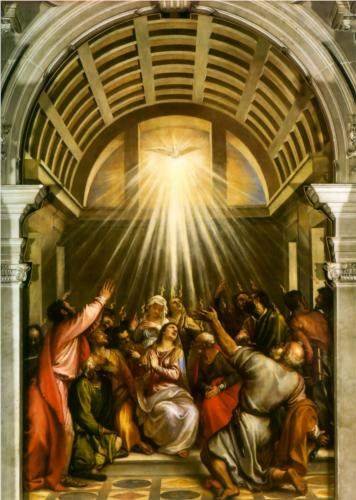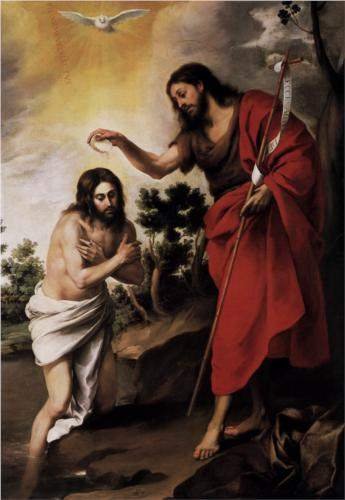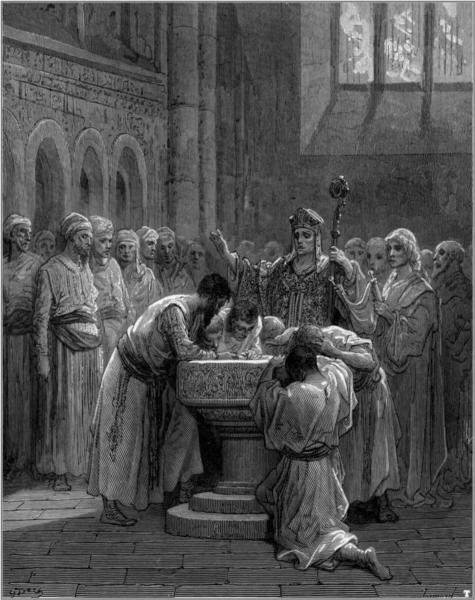Part of a series on Baptism in Depth.

In my last post on Baptism, a commenter raised an important question that I had overlooked: When John prophesied that the Messiah would “baptize with the Holy Spirit and fire,” did he refer to an efficacious Sacrament of Baptism in water, by which believers would be immersed in the Holy Spirit and filled with His fire; or was this merely a figure for the outpouring of the Spirit on Pentecost, with no implications for the Christian Sacrament? In short: Is Water Baptism the “Baptism with the Holy Spirit and fire” prophesied by John?
I conclude that “Baptism with the Holy Spirit and fire” refers to an efficacious Water Baptism — but the fire of Pentecost itself is also an image of this. These events are essentially connected. It was the arrival of the Holy Spirit at Pentecost, manifested in tongues of fire and miraculous signs, that most visibly marks the greater miracle that coincided that day spiritually: The spiritual regeneration the Spirit wrought in the waters of Baptism; the washing away of sins, and the burial of the sinful man in Christ’s Death and Resurrection in His new life. Certainly it is this redemption and rebirth, the greatest work of Christ, to which John referred in his prophecy. The charisms of the Holy Spirit in tongues and wonders are only a visible effusion of the fire within.*
* This is reminiscent of the Pentecostal doctrine I grew up with. In fact, it is a plank of the “fundamental truths” of the Assemblies of God that the charism of speaking in tongues is the initial physical evidence that a believer has been fully immersed in the Holy Spirit (“baptized in the Holy Spirit”).
There are several key verses that point to this interpretation, that necessarily connect John’s prophecy to Christian Baptism. Prior to His Ascension, the Lord told the Apostles:

And while staying with them he charged them not to depart from Jerusalem, but to wait for the promise of the Father, which, he said, “you heard from me, for John baptized with water, but before many days you shall be baptized with the Holy Spirit.” (Acts 1:4–5)
Certainly this is — and the Apostles understood it as — a promise of the descent and outpouring of the Holy Spirit at Pentecost. They thus entered the Upper Room to pray, and then:
When the day of Pentecost had come, they were all together in one place. And suddenly a sound came from heaven like the rush of a mighty wind, and it filled all the house where they were sitting. And there appeared to them tongues as of fire, distributed and resting on each one of them. And they were all filled with the Holy Spirit and began to speak in other tongues, as the Spirit gave them utterance. (Acts 2:1–4)
And it followed that all those who came to believe were commanded to repent and be baptized in water (Acts 2:38).

But the prophecy of John and of the Lord were not limited to this. For after the Holy Spirit came to Cornelius and the Gentiles, Peter reported to the other Apostles and brethren:
“As I began to speak, the Holy Spirit fell on them just as on us at the beginning. And I remembered the word of the Lord, how he said, ‘John baptized with water, but you shall be baptized with the Holy Spirit.’ If then God gave the same gift to them as he gave to us when we believed in the Lord Jesus Christ, who was I that I could withstand God?” When they heard this they were silenced. And they glorified God, saying, “Then to the Gentiles also God has granted repentance unto life.” (Acts 11:15–18)
Peter specifically relates the falling of the Holy Spirit on these Gentiles to His falling on them at Pentecost — which was prophesied by Our Lord’s prophecy, and before that, John’s. The gift He gave to [the Apostles] was the Holy Spirit; and He has here given it also to the Gentiles. But note the key here: In this passage, the gift of the Holy Spirit promised in the prophecy is definitively connected with repentance unto life — that is, with salvation. And in the initial narration of the story, that repentance unto life was marked by Baptism:
While Peter was still saying this, the Holy Spirit fell on all who heard the word. And the believers from among the circumcised who came with Peter were amazed, because the gift of the Holy Spirit had been poured out even on the Gentiles. For they heard them speaking in tongues and extolling God. Then Peter declared, “Can any one forbid water for baptizing these people who have received the Holy Spirit just as we have?” And he commanded them to be baptized in the name of Jesus Christ. (Acts 10:44–48)

Repentance unto life: John preached a Baptism of repentance, but Christ’s Baptism with the Holy Spirit and fire — also marked by repentance and a washing away of sins (Acts 2:38, 22:16) — brought new life (John 3:3–5). It is with this same language of immersion into life that St. Paul described Baptism:
Do you not know that all of us who have been baptized into Christ Jesus were baptized into his death? We were buried therefore with him by baptism into death, so that as Christ was raised from the dead by the glory of the Father, we too might walk in newness of life. For if we have been united with him in a death like his, we shall certainly be united with him in a resurrection like his. We know that our old self was crucified with him so that the sinful body might be destroyed, and we might no longer be enslaved to sin. For he who has died is freed from sin. But if we have died with Christ, we believe that we shall also live with him. (Romans 6:3–8)
Nothing for me to argue here!
One of the great things I love about the Holy Spirit is how it doesn’t give a hoot what we think proper order should be. Sometimes, the water baptism came first, then the Spirit. Other times, the Spirit comes first, then water baptism. The best we can do is respond to the working of the Spirit.
Hi Joseph, I’ve asked a question about Matthew 3:11 on your post of ‘John’s baptism as prophecy’. I want to ask something else. Peter seems to be relating Baptism of the Holy Spirit and fire (which we call Confirmation) to salvation. Does Confirmation actually relate to salvation directly the way Peter talked about it in the passage(as though he was talking of the sacrament of baptism) or maybe I’m missing something?
Hi Collins, thanks for the comments. Pardon, but I don’t see the comment you are referring to on “John’s Baptism as Prophecy.” It’s possible that it didn’t go through or was spam-canned for some reason. It’s been a little while since I wrote this article, so you may have to refresh my memory about what quotations of Peter you mean. But in general, yes, I’d sad Confirmation relates to salvation, as all outpourings of God’s grace relate to salvation. Confirmation fills us up and completes the grace of Baptism. We need all the grace we can get for this life!
I highly appreciate your reflection; I look forward to visiting your page.
God bless.
Thanks for your kind comment.